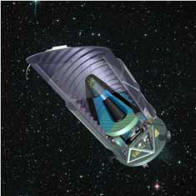
Handy Links
SLAC News Center
SLAC Today
- Subscribe
- Archives: Feb 2006-May 20, 2011
- Archives: May 23, 2011 and later
- Submit Feedback or Story Ideas
- About SLAC Today
SLAC News
Lab News
- Interactions
- Lightsources.org
- ILC NewsLine
- Int'l Science Grid This Week
- Fermilab Today
- Berkeley Lab News
- @brookhaven TODAY
- DOE Pulse
- CERN Courier
- DESY inForm
- US / LHC
SLAC Links
- Emergency
- Safety
- Policy Repository
- Site Entry Form

- Site Maps
- M & O Review
- Computing Status & Calendar
- SLAC Colloquium
- SLACspeak
- SLACspace
- SLAC Logo
- Café Menu
- Flea Market
- Web E-mail
- Marguerite Shuttle
- Discount Commuter Passes
-
Award Reporting Form
- SPIRES
- SciDoc
- Activity Groups
- Library
Stanford
Around the Bay
NASA Funds SNAP Development
 SNAP, the SuperNova/Acceleration Probe, is now one step closer to becoming a reality. Earlier this month, NASA announced its support for an advanced mission concept study of the project.
SNAP, the SuperNova/Acceleration Probe, is now one step closer to becoming a reality. Earlier this month, NASA announced its support for an advanced mission concept study of the project.
"There's a long way to go before SNAP becomes an official NASA mission," said KIPAC Assistant Director Steven Kahn. "But this is an important hurdle to have cleared."
SNAP is an experiment designed to reveal the nature of dark energy by measuring the light from thousands of distant supernovae and observing hundreds of instances of gravitational lensing.
Both supernovae and gravitational lensing offer a glimpse into the expansion rate of the universe. By comparing the redshifts of near (and thus recent) supernovae to those of distant (and thus old) supernovae, researchers can determine how the expansion of the universe has changed over time. This allows SNAP researchers to measure dark energy, the mysterious force that causes the acceleration of the expansion of the universe.
SLAC is one of several institutions participating in the project. Work at the Kavli Institute for Particle Astrophysics and Cosmology (KIPAC) focuses on the probe's electronics designs and fine guidance control system. KIPAC researchers are also studying how the probe's strong lens survey will study galaxy evolution, the Hubble constant and put independent constraints on cosmology and dark matter.
"If this project goes forward, KIPAC is likely to play a significant role," said Kahn.
Read the Lawrence Berkeley National Lab news release here.
—Kelen Tuttle
SLAC Today, August 11, 2006
Image: NASA will support the SNAP mission concept for probing dark energy. (Image courtesy of LBL.)